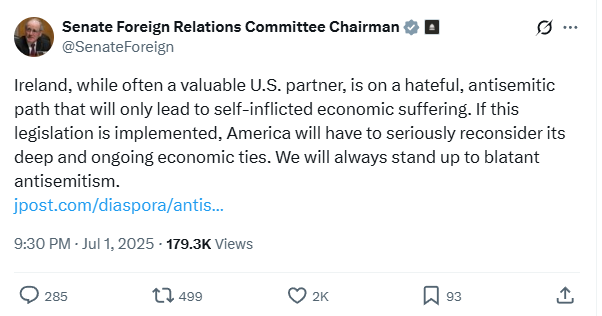Yesterday, the chairman of the United States Senate’s Foreign Relations committee, Senator Jim Risch of Idaho, had the following to say about Ireland, referencing the Government’s proposed Occupied Territories Bill:

Perhaps the most remarkable thing about this statement is the degree to which it was ignored in the Irish media. At the time of writing, several hours after Risch issued it, I can find no reference to it in any of the mainstream media outlets, who seem to have adopted the position either that it is not news, or that it is news that the public should not hear. (Note, some hours after this sentence was written, the Irish Times carried a brief news piece noting the comments)
I am not here to say whether Senator Risch is right or wrong about Ireland’s “being on a hateful, anti-semitic path”. In truth, whether he is right or wrong is functionally irrelevant. That he thinks it and is willing to say it in public is a problem for the country.
The Senate Foreign Relations Committee does not have executive powers in the way that President Trump does, or in the way that Secretary of State Rubio does. But in some ways, the powers that Risch has at his command are much more troubling: It is Senator Risch, not President Trump or Secretary Rubio, who can summon US companies to Capitol Hill for Congressional Hearings, and make life difficult in all sorts of ways for companies that invest in Ireland, or are planning to so invest.
Further, Risch is a Trump ally, and a key advisor to the President on foreign affairs.
The problem for Ireland here is simple: The Irish relationship with the United States has always been one based on friendship and fondness. The Israeli relationship with the United States is based on friendship, fondness, and military and intelligence alliances. If the United States is asked to choose between its friends and its allies, it is likely to choose its ally.
There is virtually nobody in Ireland who argues that the Government’s proposed Occupied Territories Bill is anything other than symbolic. As written, it is likely to prevent the importation to Ireland of a few avocados and dates, and little else. Even the advocates of the legislation note this fact, and that it is symbolic. Opponents on the left who think it does not go far enough complain that the bill does not include “services”, but even were those included the impact on trade would be minimal. It is symbolic legislation – a way to Ireland to register strong disapproval of Israeli policy in Gaza, Judea, and Samaria, or what Irish people refer to as the West Bank.
The problem with symbolism and symbolic policy making is that it is essentially a statement of who you are. The legislation before the Dáil is not about anything practical, so much as it is an organised legislative effort to make news on the world stage: Even advocates of the policy admit that much. Simon Harris said it himself last week when he challenged opposition TDs to call their EU allies and demand that other countries join Ireland in passing their own legislation. This bill might as well be called the “Who Ireland is” bill.
For supporters, the bill means that Ireland is a country that likes human rights and dislikes allegedly illegal occupations. That, to them, is self-evident.
The problem is that other people also get to decide what your public statements say about you. And to many people in both Europe and the United States, Ireland is about to become the first western country since 1945 to enact a boycott on trading with Jews. You can get angry with that interpretation as much as you want, by the way. It will not stop people holding it.
One such person is the most powerful voice on foreign affairs in the United States Senate. If that is his opinion, it is a reasonable assumption that it will be an opinion shared in many American boardrooms, banks, and finance houses.
The irony here is that Ireland is perfectly capable of expressing its symbolic disapproval of the Israelis in ways that would not attract this kind of attention. For example, there is the small matter of Simon Harris’s tri-weekly statements condemning the Israelis, or his student-union style Dáil speeches denouncing “Netanyahu’s genocide in Gaza”. There’s nobody who actually listens to our leaders who could possibly mistake their position.
The problem for our leaders is that talking enough does not generate listening ears. Nobody in Washington cares what Simon Harris says. It has therefore become necessary to “take action”.
But the purpose of the action is not to achieve anything other than make people listen to you. The bill will have no practical effect on the economies of the “occupied territories”. It’s sole purpose is to do something that gets noticed. In other words, the point of the occupied territories bill is to make people like Senator Jim Risch sit up and take notice of what Simon Harris is saying.
Well, he’s taking notice. The end result of him taking notice is unlikely to be a change of US policy in regards to Israel. It may well be a change of US policy in regards to Ireland.
That won’t help the Palestinians. It won’t change American policy in the middle east. It may well hurt Irish families. But at least, we can be sure, the world will have heard Minister Harris.
Loud, proud, and very clear. Because that, my friends, is what all of this is ultimately about.